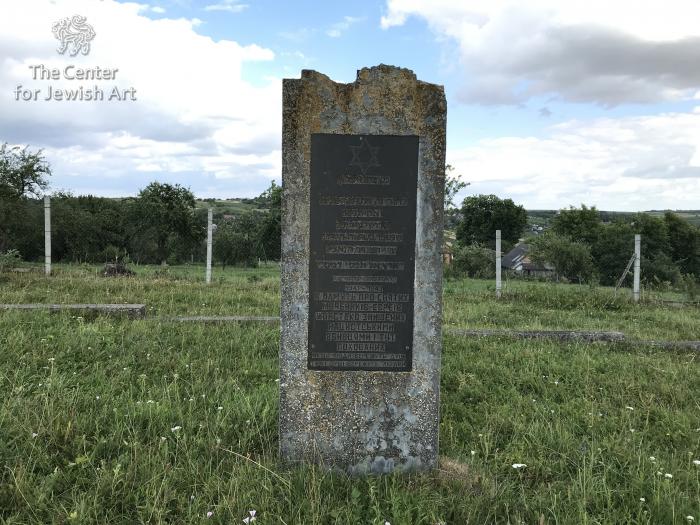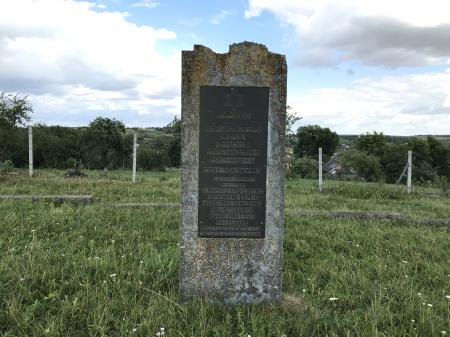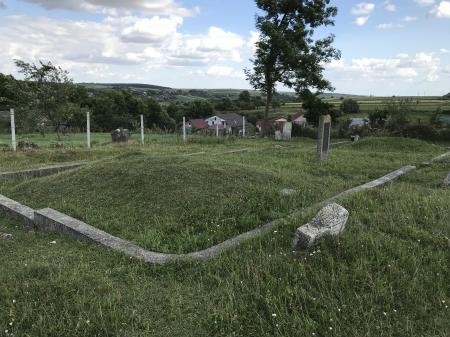Obj. ID: 44940
Memorials Monument at the mass grave in the Jewish cemetery in Pidhaitsi, Ukraine, 1990s(?)
To the main object: Jewish Cemetery in Pidhaitsi, Ukraine

Memorial Name
No official name
Who is Commemorated?
Jewish Holocaust Victims from Pidhaitsi, who were killed and buried here
Description
The monument is located on the mass grave in the Jewish cemetery in Pidhaitsi. The mass grave is marked with concrete borders. An upright slab is installed within these borders. It has an uneven top and a black stone plaque with Hebrew and Ukrainian inscriptions. A Magen David is carved on the plaque above the inscriptions. The Hebrew inscription contains a quote from Job (16:18).
Inscriptions
Hebrew:
מצבת זיכרון
להורינו, ילדינו, אחינו
ואחיותינו
קדושי עירינו,
שנספו בשואה הי"ד [=השם יקום דמם],
ע"י הצורר הנאצי.
ארץ אל תכסי דמם
קהילת פודהייצה הי"ד [=השם יקום דמם]
Translation: Memorial tombstone / for our parents, our children, our brothers, / and our sisters / martyrs of our city / who perished in the Holocaust, May God avenge their blood / by the hand of the Nazi oppressors / Earth, do not conceal their blood [Job 16:18] / The Jewish Community of Pidhaitsi, May God avenge their blood
Ukrainian:
1941 - 1943
В памʼять про святих
мучеників – євреїв
жорстоко знищених
нацистськими
вбивцями і тут
похованих
Якщо люди бережуть душі
тоді душі бережуть людей
Translation: 1941–1943. To the memory of the holy martyrs – Jews, brutally exterminated by the Nazi killers and buried here. If humans save souls then the souls save humans.
Commissioned by
Possibly, Holocaust Survivors and their families
sub-set tree:
In 1939, there were 3,200 Jewish residents in Podhajce. The German Army occupied the city on July 4, 1941. About 5,000 Jews were enclosed in a ghetto. On September 21, 1942, about 1,000 Jews were deported to the Bełżec killing center. On October 31, 1942, the second deportation took place, when about 1,200 Jews were also sent to Bełżec. In 1942, about 100 Jews managed to escape from the ghetto. Three large mass murder actions took place in Podhajce – in the summer of 1942, on October 1, 1942, and on June 6, 1943. During the last action, a number of Jews were deported to Bełżec and Tarnopol. On September 21, 1942, 50 Jews were killed in the cemetery in Podhajce. On April 12, 1943, 40 Jews were killed there. In total, about 300 Jews perished in the cemetery during 1942–1943. About 50 Jews survived the war [Zakaliuzna].
Zakaliuzna, Bozhena, "Podhajce - Karta Dziedzictwa Kulturowego," Shtetl Routes, https://shtetlroutes.eu/pl/podhajce-karta-dziedzictwa-kulturowego/ (accessed November 2, 2023)



